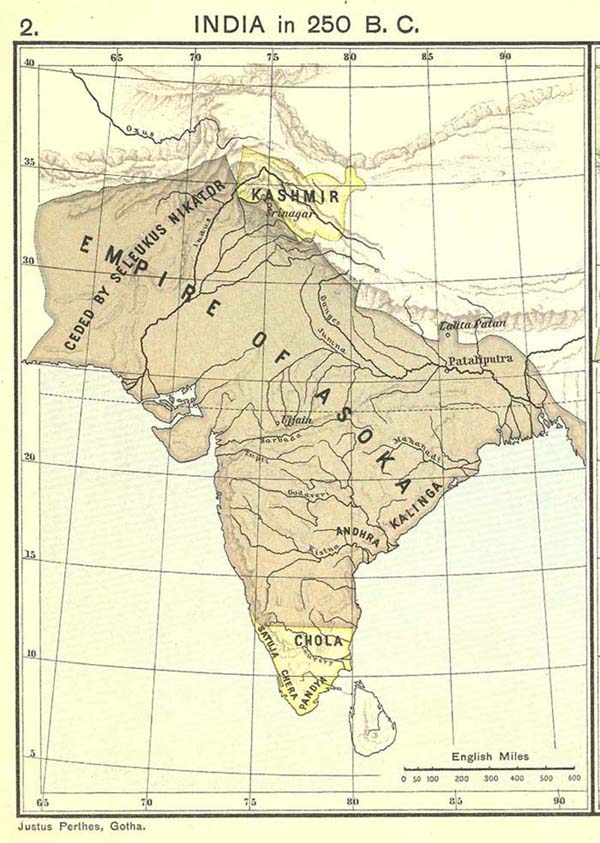A Town
BANNED

- Joined
- Feb 22, 2014
- Messages
- 989
- Reaction score
- -8
- Country
- Location
Seleucus I Nicator's invasion of India (c.306-303 BC) was one of a series of obscure campaigns fought by Seleucus in an attempt to gain control of the eastern part of his recently regained kingdom.
Seleucus was appointed Satrap of Babylon in 321 BC, and retained more of an eastern outlook that most of Alexander's successors, remaining married to his Iranian wife. In 315 BC Seleucus was expelled from Babylon by Antigonus, and was forced to flee to Ptolemy in Egypt. Three years later Ptolmey defeated Antigonus's son Demetrius at Gaza, and Seleucus took the chance to return to Babylon, where he regained power. Antigonus attempted to expel him for a second time, but was defeated in a battle somewhere near Babylon (Babylonian War).
In theory Seleucus now had control over the eastern part of the old Persian empire, stretching out to the Indus River, but in reality large parts of that empire had slipped out of Macedonian control during the civil wars. A new empire had risen in India, where Chandragupta Maurya had seized control of Magadha at about the time of Alexander's death, and now controlled most of northern India as far as the Indus (see conquests of the Mauryan Empire).
The events of the war between Seleucus and Chandragupta are obscure. Seleucus crossed the Indus, and may have advanced towards the Ganges. If there were any major battles Chandragupta must have won them, for when the war ended (possibly in 303 BC) the peace was greatly to his advantage. Seleucus abandoned any claims east of the Indus and also transferred the satrapies of the Parapanisadai (around Kabul), Aria (around Heart) and Arachosia (around Kandahar) and possible eastern Gedrosia to Chandragupta. In return he was given 500 war elephants. The treaty was to be ratified by a marriage alliance between the two men.
Seleucus made good use of his elephants, taking them 2,500 miles west to Ipsus, where they played a major part in the defeat and death of Antigonus, a victory that gave Seleucus access to the Mediterranean coast. In India Chandragupta's victory enhanced the strength of the Mauryan Empire, the first in Indian history.
Seleucus Nicator's Invasion of India, c.306-303 BC
Seleucus was appointed Satrap of Babylon in 321 BC, and retained more of an eastern outlook that most of Alexander's successors, remaining married to his Iranian wife. In 315 BC Seleucus was expelled from Babylon by Antigonus, and was forced to flee to Ptolemy in Egypt. Three years later Ptolmey defeated Antigonus's son Demetrius at Gaza, and Seleucus took the chance to return to Babylon, where he regained power. Antigonus attempted to expel him for a second time, but was defeated in a battle somewhere near Babylon (Babylonian War).
In theory Seleucus now had control over the eastern part of the old Persian empire, stretching out to the Indus River, but in reality large parts of that empire had slipped out of Macedonian control during the civil wars. A new empire had risen in India, where Chandragupta Maurya had seized control of Magadha at about the time of Alexander's death, and now controlled most of northern India as far as the Indus (see conquests of the Mauryan Empire).
The events of the war between Seleucus and Chandragupta are obscure. Seleucus crossed the Indus, and may have advanced towards the Ganges. If there were any major battles Chandragupta must have won them, for when the war ended (possibly in 303 BC) the peace was greatly to his advantage. Seleucus abandoned any claims east of the Indus and also transferred the satrapies of the Parapanisadai (around Kabul), Aria (around Heart) and Arachosia (around Kandahar) and possible eastern Gedrosia to Chandragupta. In return he was given 500 war elephants. The treaty was to be ratified by a marriage alliance between the two men.
Seleucus made good use of his elephants, taking them 2,500 miles west to Ipsus, where they played a major part in the defeat and death of Antigonus, a victory that gave Seleucus access to the Mediterranean coast. In India Chandragupta's victory enhanced the strength of the Mauryan Empire, the first in Indian history.
Seleucus Nicator's Invasion of India, c.306-303 BC








